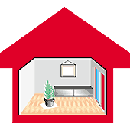
1. Entrance hall
Be sure to place a nameplate on your front door.
Since there are no master keys for housing units, take care not to lose
your key. If you do, the lock will have to be replaced at your expense.
The floor of the entrance hall is not waterproof. Do not pour
water onr the floor under any circumstances, even when cleaning.
Do not wedge anything under your front door to keep it open, as this may
warp the hinges and make it impossible to lock the door.
Be sure to insert a name card on your mailbox in the common area,
to ensure correct delivery.
If your name is not indicated on the mailbox, the postman may be uncertain
of your residence. Do not forget to put your name on the mailbox. If you
live with your friend(s), please put all of their names.
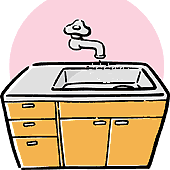
Never put garbage down the kitchen sink as it will block the drain.
Used cooking oil can also block the drain when it hardens. Do not pour
oil down the drain.
When you are done cooking, please thuroughly clean the kitchen area immediately afterwards.
If spilt oil is not properly cleaned up, it will turn into oil stains or grease spots. Once they get to this point they are nearly impossible to remove.
Make it a habit to wipe the kitchen area clean each time you finish cooking. This simple habit is the most effective way to control what could easily become a messy kitchen.
You may not remodel or redesign the balcony in any way for your own use. You may not, for example, enclose it with window sashes to make it into a small room, or use it for storage of any sort.
The care of the balcony is your responsibility, as a tenant . Be careful about rust. If you put potted plants on a balcony, for instance, water or mud from the plants could cause damage.
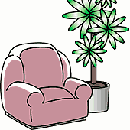
"Wa-shitsu"are rooms which use Japanese "tatami"mats
for flooring.
Tatami mats are easily damaged by moisture and dust. Wet and/or dusty tatami can attract ticks or other bugs, so take care to keep the tatami clean and well aired.
Ticks and bugs are more likely to be attracted to tatami covered with mats or rugs.
If tatami gets dirty, you can clean it by gently wiping it with a cloth soaked in diluted bleach. Use another cloth to wipe it try. Since tatami is sensitive to moisture and molds easily, try to keep windows open as much as possible.
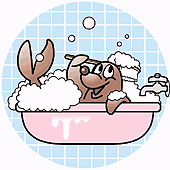
Although the bathing ritual varies from home to home, the following is a typical example of how you should bathe:
1.At first, briefly rinse with water
2.Get in the tub.
3.Wash thoroughly while standing outside of the tub.
4.Return to the tub, and soak until you're warm
5.Dry off completely.
After you've finished bathing, leave the water in the bathtub when you go.
|
Using a Public Bath
|
|
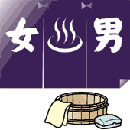 |
1.Place your clothes and things in a locker, and be sure to lock it properly. You should keep the key with you the whole time you are in the bath house. 2.Before you get into the bathtub, wash hair and body at the washing area. The bathtub is only for soaking, not for washing your body. |
| ●Asking for help in Japanese:
senntou no hairikata ga wakarimasen。oshiete kudasai。 |
|
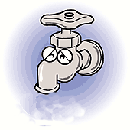
Inadequate ventilation, gas leaks, or incomplete combustion pose a danger
of causing carbon monoxide poisoning.
When you move in, have the gas company send a serviceman to open the
main gas valve in your unit, check for leaks, and explain the precautions
you should take when using gas appliances in order to prevent accidents.
If the water will not stop running in the kitchen, toilet, etc., or if
you notice that a pipe is leaking, turn off the main stopcock in the meter
box, and then contact your local office, etc.
If water is cut off while you are running the faucet, turn it off immediately.
Always ensure that faucets are properly turned off before you go out,
and if you are going to be away overnight or longer, turn off the main
stop-cock as well.
(1)Stairs and corridors
Do not leave any objects on the stairs or in corridors. They not only
get in other people's way, but also obstruct evacuation in an emergency.
Take care to guard against theft and accidents regarding bicycles, as we cannot accept responsibility for theft or other accidental loss of any kind.
If you have a bicycle that you no longer need, dispose of it properly.
Do not abandon it in the bicycle stand.